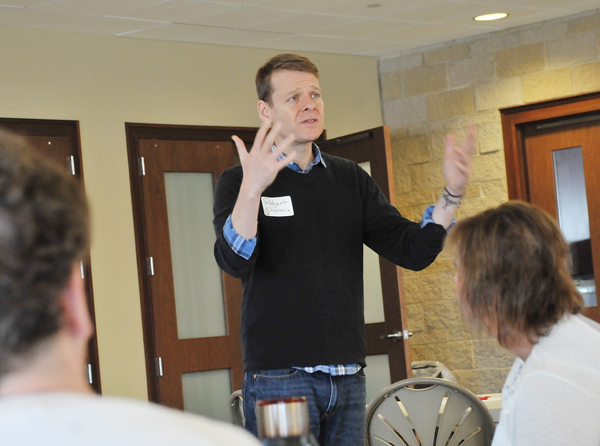(Editor’s Note: This is the seventh in a series of articles by Dan Ebener on leadership in the Catholic Church. They are excerpts from his latest book on leadership, to be published this fall.)
By Dan Ebener
For The Catholic Messenger
Emotional intelligence has been described by Daniel Goleman as a more accurate predictor of leadership success than technical or cognitive skills. In fact, your emotional quotient (EQ) is a better predictor of success in life and leadership than is your intelligence quotient (IQ).

Robert Feduccia, who founded the Youth Liturgical Leadership Program One Bread, One Cup at Saint Meinrad Seminary and School of Theology in Indiana, speaks at a Diocese of Davenport event earlier this year.
A high EQ unleashes your full IQ potential. A low EQ limits your potential because fear, anger, worry, prejudice, jealousy, anxiety and ignorance will limit your performance. IQ is described by Goleman as a “threshold competence.” It gets you in the door for an interview, and possibly gets you hired. But EQ is a “distinguishing competence” that will set you apart as a top performer after you are hired.
There are four areas that add up to emotional intelligence:
(1) Self-Awareness (Mindfulness) = ability to be aware of your own emotions
(2) Self-Control = ability to guide your own behaviors
(3) Social Awareness (Empathy) = ability to identify with the emotions of others
(4) Social Skills = ability to facilitate interaction during emotional episodes
The plasticity of the brain allows for re-training to become more aware of what is going on inside and around us, more positive in expressing our own emotions and more able to show empathy toward others. We can train ourselves to become more empathetic by developing stronger connections between the brain and the heart. Interestingly, research shows that we can strengthen the neural connection between head and heart through religious practices such as reading Scripture, attending Mass, singing hymns, receiving the Eucharist, saying the rosary or practicing eucharistic adoration.
Guiding the interaction of a team during an emotional episode requires a great deal of patience, humility and empathy. The emotions of the leader are contagious. When a leader shows empathy, the people are more likely to empathize as well. They are more likely to trust each other, work as a team, help each other out, take the initiative on new projects, participate in the activities of the parish and develop themselves as disciples.
Without self-awareness, it is unlikely we will succeed in the other three areas of emotional intelligence. We live with many regrets for yesterday and worries about tomorrow. The past and the future are the two biggest obstacles to living fully in the present.
To act with all four steps of emotional intelligence, we must be fully awake to the present moment. Emotional intelligence engages the mind and the heart. We can train our minds and form our hearts to improve our emotional intelligence by practicing our Catholic faith.











